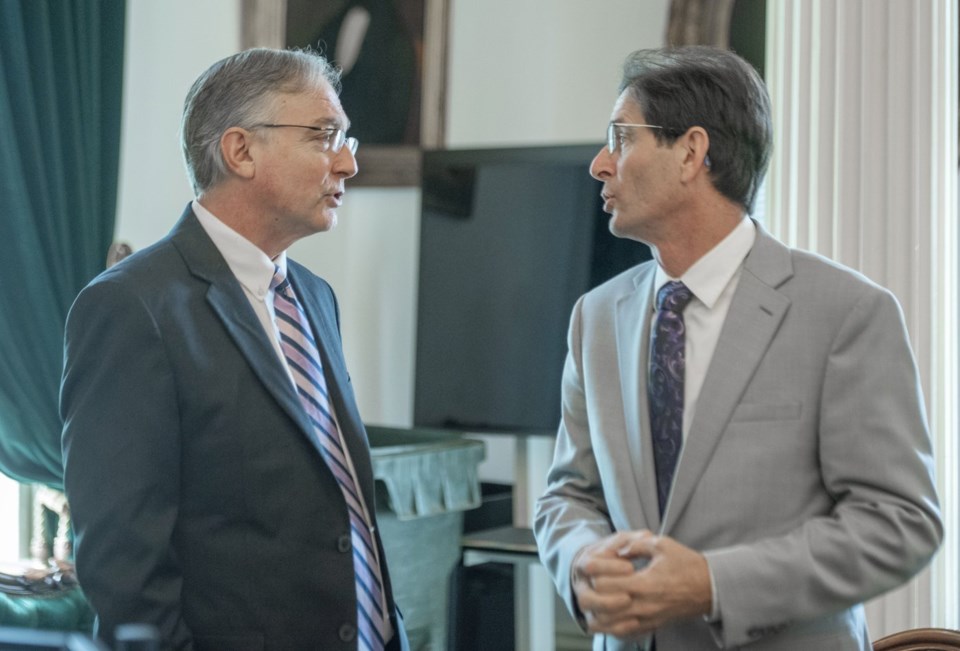The Democratic-controlled Vermont Legislature passed a law Monday that allows for the creation of a pilot overdose prevention center in the state's biggest city, Burlington, overriding a veto by the state's Republican governor, Phil Scott.
The law allocates $1.1 million for the creation of a center, including a safe injection site where people can use narcotics under the supervision of trained staff and be revived if they take too much.
The money will go to the state Department of Health to award grants to Burlington to establish such a center. It will come from the Opioid Abatement Special Fund, which is made up of Vermont’s share of a national settlement with drug manufacturers and distribution companies.
“The data is clear. Overdose prevention centers save lives, connect people to treatment, reduce pressures on emergency rooms and Emergency Medical Services, and reduce public drug consumption and discarded supplies in our communities,” Senate President Pro Tem Philip Baruth said in a statement.
The center will provide referrals to addiction treatment as well as medical and social services. It also will offer education about overdose prevention and distributed overdose reversal medications.
Two years ago, the first sanctioned overdose prevention centers in New York City opened, according to the Drug Policy Alliance. Rhode Island is expected to open one in Providence this summer.
The vote came after Legislature reconvened Monday to try to override Scott’s vetoes of several bills, including one that would crack down on the use of online personal data by companies.
By Monday afternoon, the state House and Senate had overturned the governor's veto of a bill that requires state utilities to source all renewable energy by 2035, making Vermont the second state with such an ambitious timeline. Scott had said the renewable energy bill would be too costly for ratepayers. Under the legislation, the biggest utilities will need to meet the goal by 2030.
"The renewable energy standard will put Vermont on track to achieve 100% renewable electricity by 2035, dramatically reducing planet-warming carbon pollution and saving Vermonters money over time," Baruth said in a separate statement. He called the governor's veto an attempt to continue rejecting “critical progress on climate action" at a time when Vermonters still are facing "the impacts of recent climate disasters.”
The Legislature also voted to override Scott's vetoes of a property tax bill to pay for education that would increase property taxes by an average of nearly 14% and create a committee to recommend changes to make Vermont’s education system more affordable. Scott has said Vermonters cannot afford double-digit tax increases.
In addition, the Legislature overrode Scott's veto of a measure that restricts a type of pesticide that’s toxic to bees. The Legislature passed the bill after New York Gov. Kathy Hochul signed off on what she described as the nation’s first law last year to severely limit the use neonics in her state. In vetoing the bill, Scott said it was "more anti-farmer than it is pro-pollinator.”
Each chamber needs two-thirds of those present to vote to override to be successful in passing the bills.
Scott vetoed eight bills this session, saying last month that the Legislature is out of balance and at times "focuses so much on their goals they don’t consider the unintended consequences.” While his vetoes aren't popular in Montpelier, “I’ll take that heat when I believe I’m making the right choice for the everyday Vermonter,” Scott said.
The data privacy bill was considered to be among the strongest in the country that would allow consumers to file civil lawsuits against companies that break certain privacy rules. Scott vetoed the legislation last week, saying it would make Vermont “a national outlier and more hostile than any other state to many businesses and non-profits.”
Lisa Rathke, The Associated Press

